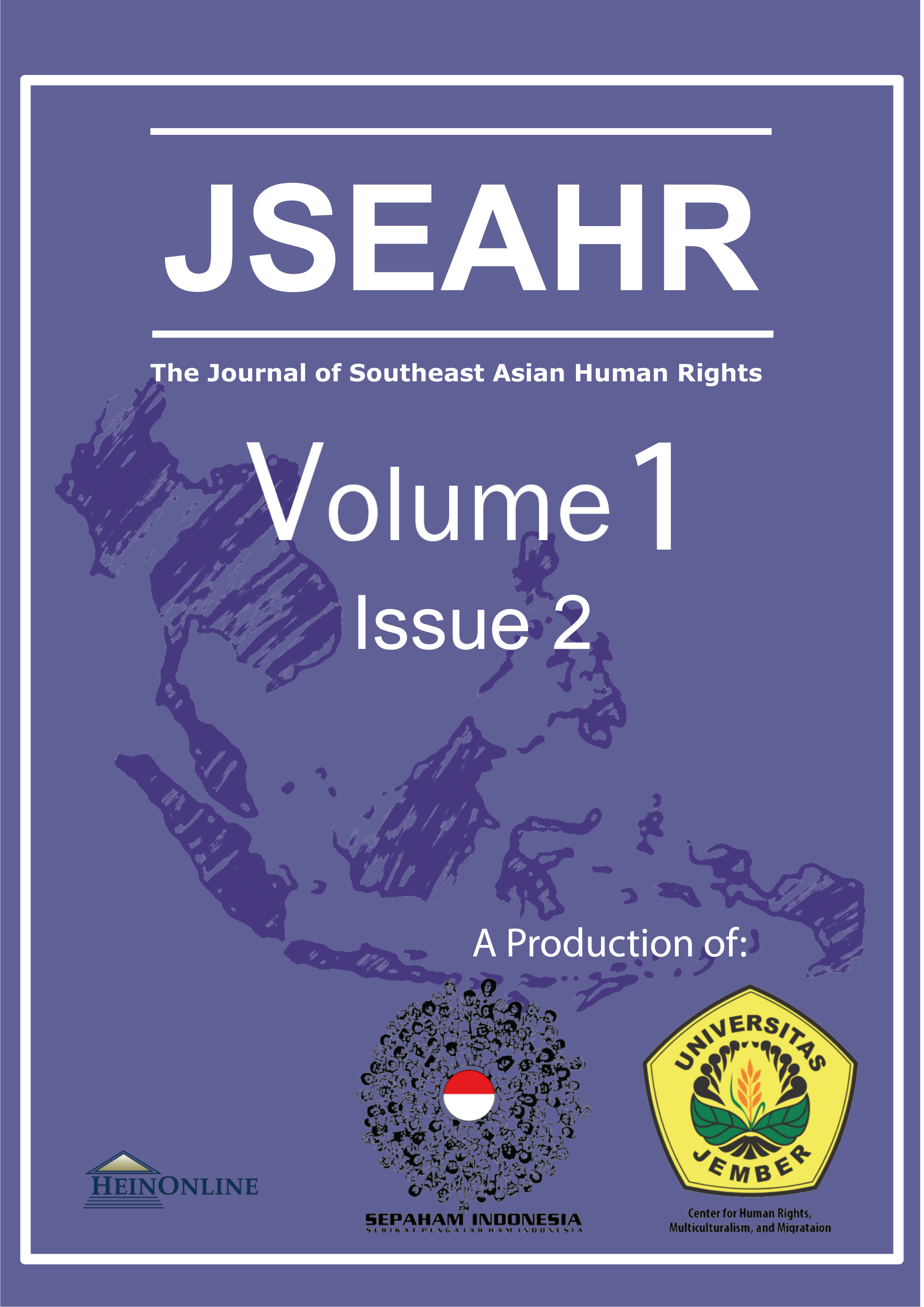Human Rights in Southeast Asia
Are We Moving Backward?
DOI:
https://doi.org/10.19184/jseahr.v1i2.5293Abstract
Many challenges exist regarding the discourse over human rights in South East Asia due to the complex relationship between the region’s myriad cultures, laws, religions and political desires. This socio-political environment produces a number of varying, and often contradictory, interpretations of human rights, as well as differing opinions on how they should be implemented. On one hand, some countries in Southeast Asia have internalized international human rights instruments by amending their constitutions in order to provide a semblance of protection for their citizen’s human rights. On the other hand, some countries still operate under authoritarian regimes and continue to violate certain internationally recognized rights for the sake of preserving political stability and economic development. Proponents of such regimes often claim that this is done to maintain both societal and religious harmony. Therefore, the effort to address human rights issues in Southeast Asia must expand beyond the international legal sphere and take into account the intricate relationships and power struggles between the region’s various economic interests, social and cultural norms, and religions. Furthermore, the successful implementation of human rights law in Southeast Asia will require a number of obligations and checks be imposed on the state governments in the region. The specific means by which to promote human rights in South East Asia, and how to reconcile diverging options on the definition and scope of said rights, was the theme of the 2nd Annual Conference of the Centre for Human Rights, Multiculturalism and Migration (CHRM2) and Indonesian Consortium for Human Rights Lecturers (SEPAHAM Indonesia), held in August, 2017, at the University of Jember. This article is a summary of the major points and topics covered during the two day conference.
Downloads
References
Benkin, Richard L. What Is Moderate Islam? (Lexington Books, 2017).
Chiba, Masaji. Legal pluralism: toward a general theory through Japanese legal culture (Tokai University Press, 1989).
Coulson, Noel James. Conflicts and Tensions in Islamic Jurisprudence (University of Chicago Press, 1969).
Croce, Mariano. The Legal Order (Routledge, 2017).
Katz, Stanley N. The Oxford International Encyclopedia of Legal History (Oxford University Press, 2009).
Knights, Samantha. Freedom of Religion, Minorities, and the Law (Oxford University Press, 2007).
Kymlicka, Will. Multicultural Citizenship: A Liberal Theory of Minority Rights (Clarendon Press, 1996).
Naarmann, Bennedikt. Der Schutz von Religionen und Religionsgemeinschaften in Deutschland, England, Indien und Pakistan (Tübingen: Mohr Siebeck, 2015).
Sen, Amartya. The Idea of Justice (Harvard University Press, 2011).
Singh, M P. Examining India’s Common Law Identity (Mumbai: Oxford University Press, 2017).
Chiba, Masaji. “Three-Level Structure of Law in Contemporary Japan, The Shinto Society†in Asian Indig Law Interact Receiv Law (London ; New York: KPI, 1986).
Maeso, Silvia RodrÃguez & Marta Araújo. “The semantics of (anti-)racism in the governance of non-Europeanness: an introduction†(2017) 51:1 Patterns Prejudice 1.
Menski, Werner F. “Plural Worlds of Law and the Search for Living Law†in Rechtsanalyse Als Kult (Frankfurt am Main: Vittorio Klostermann, 2012).
———. “Law as a Kite: Managing Legal Pluralism in the Context of Islamic Finance†in Islam Finance Eur Plur Financ Syst (Chelthemham: Edrward Elgar Publishing, 2013).
———. “Review of: Benedikt Naarmann, Der Schutz von Religionen und Religionsgemeinschaften in Deutschland, England, Indien und Pakistan. Ein interkultureller Straftrechtsvergleich†(2015) 48:3 Verfass Recht Übersee.
Schulze, Kirsten E. “The ‘ethnic’ in Indonesia’s communal conflicts: violence in Ambon, Poso, and Sambas†(2017) 40:12 Ethn Racial Stud 2096.
Menski, Werner F. “Bangladesh in 2015: Challenges of the ‘iccher ghuri’ for learning to live togetherâ€, (30 December 2015), online: Alochonaa Dialogue <https://alochonaa.com/2015/12/30/bangladesh-in-2015-challenges-of-the-iccher-ghuri-for-learning-to-live-together/>.







